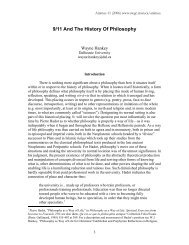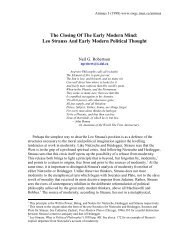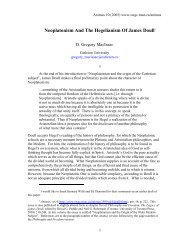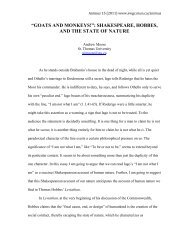Floy E Andrews, On Reading Philosophy after Analytic Philosophy.
Floy E Andrews, On Reading Philosophy after Analytic Philosophy.
Floy E Andrews, On Reading Philosophy after Analytic Philosophy.
Create successful ePaper yourself
Turn your PDF publications into a flip-book with our unique Google optimized e-Paper software.
ANDREWS: ON READING PHILOSOPHY AFTER ANALYTIC PHILOSOPHY<br />
it is sound, it is required that we show the price that has been paid in taking the formal<br />
system of PM as authoritative, the given orthodoxy. This will also shed more light on the<br />
impropriety of Anscombe's remarks above. Henry Veatch put the inadequacy of<br />
"classical logic" rather dramatically thirty years ago:<br />
Has it never struck anyone as passing strange that the logic of Principia<br />
Mathematica, for all its elaboration, provides no means either for saying<br />
or thinking what anything is And if we not only cannot claim to know<br />
what things are, but if our very logic debars us from even stating or<br />
formulating propositions as to what this, that, or the other thing is, then the<br />
very idea of what a thing is, or the very conviction that each thing is what<br />
it is, that things are what they are, or indeed that anything is anything<br />
becomes simply impossible, or at least logically improper.<br />
So what Why worry about what things are Will computers, or deficit<br />
financing, or atomic explosions, or whatever else this present age esteems<br />
be any the less effective merely because people no longer ask the question<br />
"What is it" ... Perhaps, though, this is just the point, that modern culture<br />
is not merely despairing of ever answering the question "What" but that it<br />
no longer even wants the question to be asked, or at least not seriously. 16<br />
To understand the ramifications of this deficiency we must go to the heart of the<br />
Fregean/Russellian system. Frege held that the syntax of natural language was hopelessly<br />
muddled, misleading and inconsistent; and therefore that one must construct an artificial<br />
language (as sketched above) which would be a more accurate and reliable representation<br />
of the structure of thoughts than natural language. 17 Such a language and the logical<br />
But note George Englebretsen, Something to Reckon With: the Logic of Terms, Ottawa, 1996, 54:<br />
"Generally speaking, the twentieth century has seen a fairly clear division of philosophy into two quite<br />
different branches. <strong>On</strong>e, analytic philosophy, has been pursued mostly in English-speaking countries ...<br />
More importantly, it has taken formal logic, in one guise or another, to be an essential tool in its<br />
investigations. The other branch of philosophy encompasses a much broader range of philosophical<br />
programmes, most of which have been pursued by philosophers on the European continent...Continental<br />
philosophers have generally abjured recourse to the results of the natural sciences ... In particular, they have<br />
generally had little regard for logic - especially formal logic. But the two very closely related fields of<br />
philosophy of logic and philosophy of language have come to dominate the work of analytic<br />
philosophers..." Michael Dummett in Origins of <strong>Analytic</strong>al <strong>Philosophy</strong> (Cambridge MA, 1993) argues<br />
that analytic philosophy and phenomenology share the same roots. But analytic philosophy is<br />
distinguishable from phenomenology and other schools "in the belief ... that a philosophical account of<br />
thought can be attained through a philosophical account of language." (p.4) <strong>On</strong> Dummett's account analytic<br />
philosophy was born when the "linguistic turn" was taken.(p.5) But the contributors to the collection of<br />
articles titled The Rise of <strong>Analytic</strong> <strong>Philosophy</strong> (ed. Hans-Johann Glock, Oxford, 1997) take exception to<br />
Dummett's account. They regard the characterization of analytic philosophy as consequent upon the<br />
"linguistic turn" as stipulative definition marking no more than what Dummett himself regards as of value<br />
in philosophy. (p. viii)<br />
16 Two Logics, Evanston, Ill., 1967, 26-7.<br />
17 . "I started out from mathematics ... The logical imperfections of language stood in the way of such<br />
investigations. I tried to overcome these obstacles with my concept-script. In this way I was led from<br />
mathematics to logic." "Notes for Ludwig Darmstaedter" in Gottlob Frege, Posthumous Writings, trans.<br />
Peter Long and Roger White, Oxford, 1979, 253. Alfred Tarski argues further in his "Concept of Truth in<br />
98

















